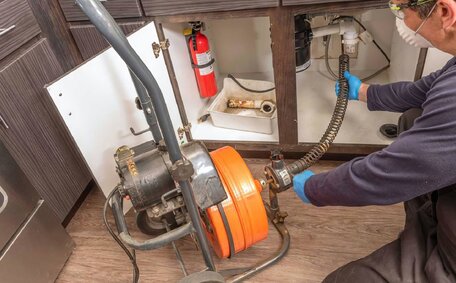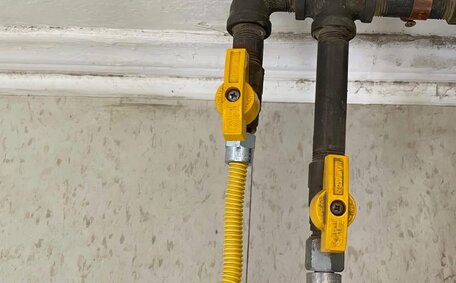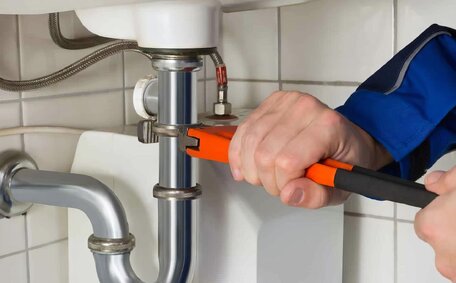Grease and Oil Buildup
Cooking grease and oil solidify in pipes as they cool, obstructing water flow by narrowing the internal space. The infamous 250-metre fatberg in London’s sewers is a stark example of the extent to which these substances can clog drains.
Even minor grease deposits can accumulate over time, gradually obstructing your pipes to a degree that might surprise you. Cumulatively, 500mL of grease per month totals to 6 litres a year, significantly restricting drainage and heightening the risk of major blockages. And since grease adheres to the pipes, it also captures other debris, which becomes problematic without running water to flush them through.
- Avoid pouring grease down the sink or drain openings, since it’s a primary cause of blockages. Let it cool in a container, then toss it in the trash.
- Fit drain strainers to capture food particles and foreign objects, which will help keep these potential blockage components out of your plumbing.
- For cleaning, use baking soda and vinegar to break down oils, but avoid excess boiling water, as it can damage pipes.
Careful preventative maintenance helps home cooks keep drains clear, preventing clogs and maintaining hygiene.
Causes of Grease Clogs
Several commonplace cooking habits can hasten grease buildup and drain clogs:
- Discarding oils, fats, hair, soap residue, and meat drippings down the drain.
- Not thoroughly scraping plates or cookware before washing.
- Failing to collect bacon grease or letting it solidify in pans.
- You should also be mindful of using too much oil when sautéing or frying foods as it can lead to drainage problems.
- Submerging oily utensils in soapy water in the sink.
Grease that enters and cools within pipes adheres to their walls, initiating clogs. Subsequently flushed food particles get trapped, potentially leading to pipe blockages over time. Prevent this by:
- Install stainless steel grease catchers in sinks to intercept fats, protecting pipes from potential damage.
- Composting food waste that drains your resources to maintain a minimal environmental footprint instead of resorting to the garbage disposal.
- Frequently running baking soda and vinegar solutions down drain to prevent build-ups.
Proper grease disposal helps ensure that drainage systems can manage everyday cooking refuse.
Clearing Grease Clogs
Addressing grease clogs promptly can prevent the need for expensive repairs to home drainage systems. Employing simple household mixtures like baking soda and vinegar can help break up fat deposits early, keeping drains flowing freely.
Learn more about addressing mild clogs from recent grease entry by pouring 1 cup of baking soda followed by 1 cup of heated vinegar down the drain. After 5 minutes, pour hot water down the drain to rinse away debris. Repeat weekly as preventative maintenance.
For serious blockages causing gurgling noises or slow drainage, use a mechanical drain snake to extract debris. When it’s time call professional hydro jetting services for fully blocked pipes - this technique powerfully ejects clogs using highly pressurised water.
Chemical drain cleaners cannot dissolve substantial grease blockages, especially once they’ve hardened into fatbergs. Avoid products containing lye, acids or chlorine that corrode pipes when used excessively. For recurrent clogs, installing a grease trap can be an effective way to filter out grease fat during dishwashing.
Remain alert to the correct disposal of cooking grease, with your health and drain protection in mind. Contact us today at the first signs of blockages to prevent the need for extensive plumbing repairs.
Food Scraps and Organic Waste
Food scraps, including fruit peels, eggshells, and teabags, often lead to drain blockages.
Food scraps decompose into thick clumps that significantly hinder water flow. Meat, dairy products, and oily remnants hasten this decomposition, while rotting matter releases foul gases and becomes a lure for fruit flies and cockroaches.
To avoid organic waste clogs:
- Before washing, use paper towels to remove fats and oils from cookware.
- Compost fruit and vegetable scraps for garden use rather than using the garbage disposal.
- Employ sink strainers to intercept any food particles when doing the washing up.
- Ensure commercial food disposal units come with grate covers and have sufficient capacity, power, and ventilation for your needs.
- Perform drain cleaning for sink drains on a regular basis with a baking soda and vinegar solution to dissolve built-up gunk.
Teaching all staff best waste disposal practises is essential for maintaining clear drainage in food production areas, ensuring critical safety, sanitation and hygiene standards are upheld.
Coffee Grounds and Tea Leaves
Coffee grounds, tea leaves, and similar kitchen waste frequently make their way into drains. However, such small debris can accumulate, and When cleaning, pouring vinegar down the drain might help dissolve the blockage before it becomes a major issue.
Decomposing coffee grounds and tea leaves bind into compact masses, creating blockages. Residual oils covering these clumps make them cling stubbornly, rising up into the pipes, cause obstructions and impede water flow. A few cups worth collected after cooking monthly builds up over years into major obstructions.
To avoid coffee and tea clogs:
- Don’t dispose of liquid coffee, damp grounds, or tealeaves in the sink; let them dry before binning or composting them.
- Use sink strainers to catch stray grounds when washing mugs or teapots.
- Consider composting your food scraps like coffee grounds instead of allowing them to go down the sink.
- Clean pipes weekly with baking soda and vinegar to help break up accumulating grit.
Properly disposing of used coffee and tea remains is key to maintaining clear drains. Small daily actions prevent major pipe repairs being necessary down the track.
Fruits and Vegetables
Fruit and vegetable peels, skins, and seeds entering kitchen sinks frequently cause clogs. Fibrous materials like celery strands or lettuce leaves can tangle in pipes. As they rot, swelled debris sticks to grease or fat, forming dense blockages.
The acidic juices from citrus fruits can slowly erode pipes over time. And certain vegetables like potato peels rapidly expand, jamming a mass against pipe walls.
To avoid fruit and veggie clogs:
- Throw all food scraps in the bin – never the sink.
- Use sink strainers to catch stray items when washing produce.
- Consider backyard composting instead of a garbage disposal to reduce landfill waste.
- Clean pipes monthly by pouring a baking soda and vinegar mixture down sinks.
With attentive waste disposal habits, kitchen sinks can readily handle vegetable prep without drainage issues.
Starchy Foods
Starchy foods like pasta, rice, potatoes, and bread can cause problems and pose a risk to drains. However, these water-soluble carbohydrates can wreak havoc on pipes when washed down drains.
Starchy foods absorbing water can make them swell and expand, turning into masses where water can barely pass, resulting in blocked pipes. Oils or fats from cooking trap soggy starches against pipe walls, where bacteria feeds and festers, producing unpleasant sulphur smells.
To avoid starchy clogs:
- Never let rice water, leftover pasta/potatoes or excess dough be poured down your sink, as this can cause blockages.
- After preparing food, use sink strainers and collect food scraps for composting before you wash your hands.
- Limit use of garbage disposals to small amounts of rinsed scraps.
- Monthly, pour a baking soda and vinegar mixture down pipes to help dissolve buildups.
With mindful disposal of starchy waste and regular maintenance, your plumbing system can readily handle everyday cooking needs.
Preventing Drain Clogs
Avoiding drain clogs is crucial for preventing plumbing issues in your home and maintaining sanitation. By establishing simple habits and maintenance routines, home cooks can minimise risk and accommodate everyday food prep needs without issue.
The most effective preventative measures include:
- Installing sink strainers that require grate to keep food debris out of drains.
- Collecting oils/fats for disposal rather than pouring down sinks.
- Having compost bins to divert fruit and vegetable waste from pipes.
- Utilise drain screens when washing greasy cookware or dishes to lessen the chances of clogs.
- Routinely cleaning pipes with baking soda and vinegar solutions.
- Taking early action for minor clogs before major fatbergs form.
- Knowing when to schedule routine professional drain inspections and maintenance is crucial.
Upgraded plumbing systems designed for food production can handle the demands of food processing and prevent overloads and blockages. Consider larger-gauge pipes, higher-powered garbage disposals, grease traps for commercial kitchens and sufficient septic tank volumes.
Remaining vigilant in waste management, employing preventive tools, and scheduling prompt services are crucial points to consider when preventing costly, health-risk drain disasters.
When to Call a Professional Plumber
If you’re dealing with a severe clog or backup, it’s recommended to have your drain pipe professionally inspected. Signs it’s time to phone Abbotsbury Plumbing on 1300 349 338 or email jobs@abbotsburyplumbingservices.com.au include:
- Call a professional if you notice water backing up from drains or sinks with unpleasant odours present.
- Gurgling sink drains that completely block even after trying baking soda and vinegar treatments.
- Toilet bowls overflowing or very slow to drain, signaling issues that can occur in your plumbing system.
- Standing water around your home and yard from chronic drainage issues.
- Low hot water pressure or tubs/sinks draining slowly throughout your home.
A professional plumber like Abbotsbury Plumbing has the expertise and industrial-grade equipment to clear blockages, including those caused by tree roots, in your sewer system and thoroughly assess the system with camera inspections to identify root issues. Attempting extensive repairs yourself brings about risks associated with further damage plus contamination.
By arranging prompt drainage servicing done right as problems arise, you can restore free flow, uphold sanitation standards and ensure everything is running smoothly with solutions to stop recurrence. Abbotsbury’s team handles all repair complexities so your household plumbing keeps functioning smoothly.






